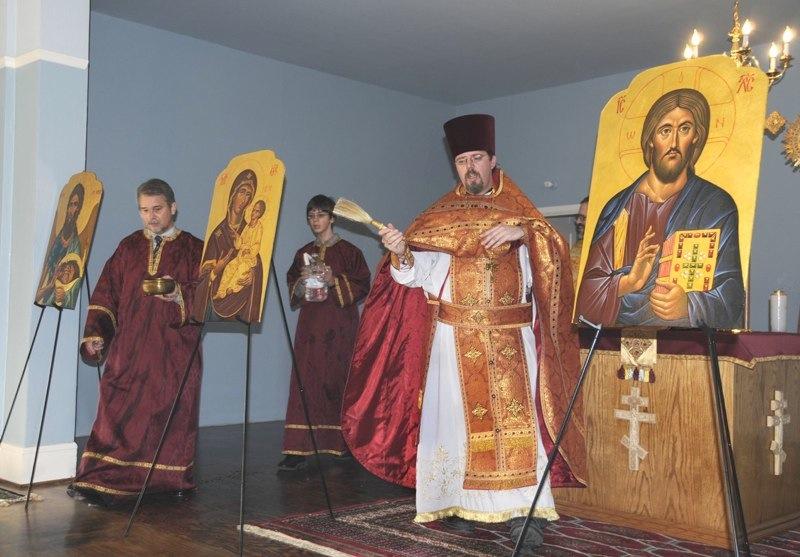We have a priest!
Well, we've always "had a priest." We had Fr. Gabe as our priest-in-charge from the inception of this mission, up until last month. He served honorably and loved us and guided us well.
And we also had Fr. Tom, from this past June until last month, serving as our visiting priest, ensuring we were able to have Sunday communion services and confession without having to go to two different places to get all of that. He also served honorably and loved us and guided us well.
This is different, though more in scope than in kind. Fr. Seth Earl is now our priest-in-charge and is formally attached to our little mission. He is serving honorably and loving us and guiding us well. But he is ours. We are his. That was all true with Fr. Gabe and Fr. Tom as well, and both of those fine priests always treated us as their own, and we loved them as our own. But neither of them was called to devote their full attention to us, and not because they did not want to. Fr. Gabe is the rector of a very busy parish in Atlanta. Fr. Tom is retired. St. Patrick could not be first priority for either of them. They were our fathers, and they were fatherly, but they also had their own flock and their own lives.
That, in itself, is good in its own way. It teaches us that we are not so very important. It teaches us to defer to our brethren, whether those at St. John the Wonderworker who shared a father with us, or those in Fr. Gabe's or Fr. Tom's respective families who would like to see them on occasion, or simply to one another. It teaches us to be patient and wait for the Lord to act. I am certainly not complaining about not having a full service life or priests who look after our every concern. It is good for us, and it is good that the Church sends us shepherds as she has the ability to do so. The alternative would be sending shepherds who are not ready, or who cannot keep up with the demands of too many sheep. We have been blessed beyond measure by the shepherds she has sent us.
But now she has sent us our very own shepherd. And he is another blessing.
I have heard many people speak of how missions sort of spin their wheels and mark time up until they get a priest, and then things begin to really move. There are reasons for that involving practicality -- a parish seems "real" when there is a clergyman there who can do everything any other parish can do, and it seems somehow "less than" if it cannot do everything any other parish can do. That's normal. You might give a new dentist a chance if he has a meager and modest office, but probably not if he starts pulling drills and picks and scalers from the trunk of his car and asks you to sit down on the curb and tilt your head back. There is a "marketing" aspect to having a full liturgical life and a priest of your own. There is a worldly sense of authenticity and competence.
But beyond practicality, I am convinced that there is a spiritual component to it. There is a concreteness to having the diocese send you a priest, put him on the church's website and say "this man is attached to this mission" for the world to see. There is no confusion, and no overlapping magisteria. There is no division of priorities and no overwhelming the pastor with the responsibilities of shepherding dual parishes. We have one priest who is in charge of the entire mission, entrusted by our Archdiocese to be our pastor. This binds us all together as a parish family, with a spiritual father. And fathers are important, in the parish as much as in the home. We think of a parish having a "head," not in terms of worldly responsibility, but in the sense of binding it all together, as the Father binds the Holy Trinity in Himself, and is its fount and source. Fathers are not merely deciders. Fathers are the glue that holds the family together as one.
Fr. Seth's first services with us as our pastor came this past weekend. With them, there was a sense that this is finally real. Someone is now in place to care for us, to protect us, and to ensure that the Church flourishes in our little corner of West Georgia. We are his sole priority in terms of shepherding. And while in the world, some of those things are administrative functions, in the Church (as in the family and in the home), they are also spiritual and ontological. Fr. Seth isn't just our leader, or our boss. He is our father in Christ. Like most priests, he is fatherly in his approach. Which is to say, he leads gently, but firmly. He loves. He is kind and patient. When we err he forgives us. When he eventually errs, we will forgive him. We learn to become spiritual children, not in the sense that we've all done it before, but in a day-to-day sense. We learn to submit, and to honor, and to return the love Fr. Seth shows forth to us, because it is the love of Christ Himself, Who through His Church sent Fr. Seth to us. In turn, good fathers show forth Christ by seeing Christ in their children, and in everyone else around them. A good father teaches us to do the same, to him and to everyone around us as well.
We are under no delusion that our new priest is perfect. We have all been fortunate to serve under some extraordinary priests. Stephanie and I have had the great fortune, most recently, of being shepherded by Fr. Paul, who is an outstanding priest. For a brief time since, we have served under Fr. Gabe, and of course our first priest was Fr. Andrew, both of whom are outstanding priests. We have had Fr. Tom serve as our spiritual father and confessor for the past several months, and Fr. Tom is another outstanding priest. We know what it means to have great priests, and we know that the greatest of those priests is not infallible. Priests are men. Like biological or adoptive fathers, our spiritual fathers are sure to fail us at times. When that inevitably happens, I must remember my own failings as a father, and forgive as I would hope my children forgive me.
We also know that Fr. Seth is aware that none of us is infallible. We will mess up. We will disappoint him, fail him, perhaps hurt him. When we do, he will forgive us. Not because he is legalistically bound to forgive. Not even because he wants to forgive deep down in his heart (though he surely does). He will forgive because that is what fathers do. Not in a legalistic sense, but simply because we are his children.
Those bonds of love in the Church are not always easy, and they do not always result in warm and fuzzy feelings. Sometimes loving and forgiving other people is hard and messy. Sometimes it leaves us feeling hypocritical, or perhaps taken advantage of. But through the Church, those bonds lead us to salvation. And that begins with the Church giving us a father. Thanks be to God!















